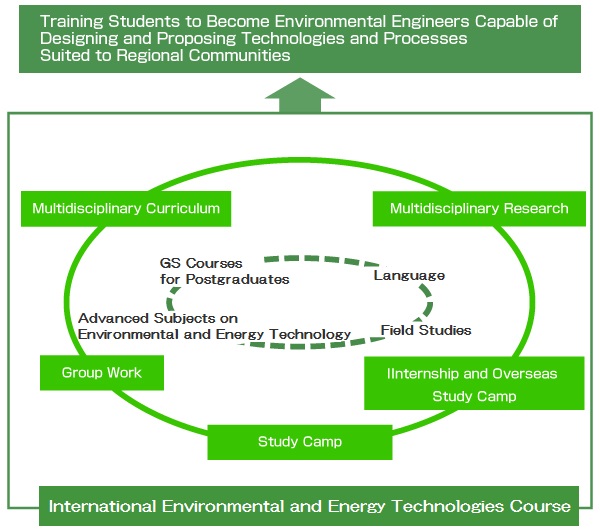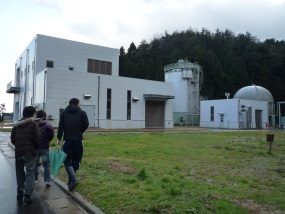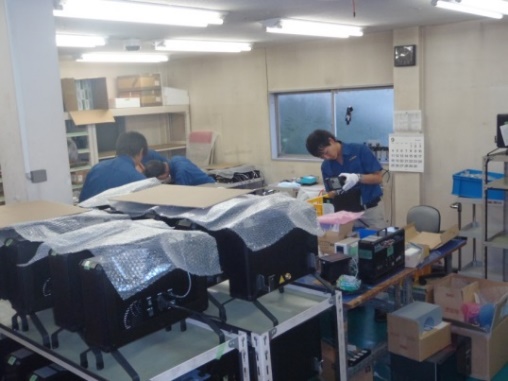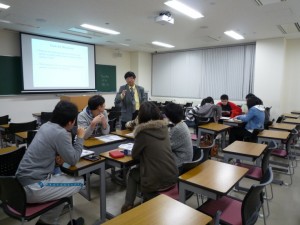General Outline
- HOME>
- General Outline
Purpose of the Course / Human Resources to be Developed / Outline / Features
Purpose of the Course
The rapidly growing Asian and African regions are expected to continue to grow long into the future as the core of global economic stability. However, these regions are currently facing the serious threat of increased environmental degradation. This problem is caused by the increase in resource and energy consumption resulting from industrial development and population increase. In order to eradicate this threat and to realize a sustainable global society, it is crucial for each country to devise its own unique industrial development scenario based on its circumstances, and to subsequently develop or adopt environmental and energy technologies. As the global leader located in East Asia, Japan is responsible for stimulating green innovation in developing regions. The purpose of this course is to foster human resources for the global community who are capable of developing Japan’s superb energy- and environment-related technologies into technologies suited to other countries’ circumstances by taking regional characteristics and culture into consideration, and capable of deploying such technologies in an international setting.
Human Resources to be Developed
In addition to possessing advanced knowledge and skills in environmental technology, globally active environmental engineers must have the ability to understand the culture and history of each region, and based on that understanding, to design and present technologies and processes suited to the regional communities. This course produces human resources capable of playing active roles in the global community, who possess
- Provides advanced environmental engineering knowledge and skills.
- Provides advanced communication skills that allow students to collaborate with engineers from other countries and understand the historical and cultural backgrounds of the local residents who will be the users of the environmental technologies.
- Trains students to become human resources who will play an important role in global society; they will have the leadership skills that are required to propose technologies and processes to deal with cross-border environmental issues, which are tailored to regional circumstances.
Furthermore, this course produces human resources capable of serving as a bridge between Japan and other countries at local sites of environment- and energy- related research and technological development, and capable of contributing to the development of sustainable societies through cross-border collaboration.
Outline

Features
Training Camp that Takes Advantage of Regional Characteristics

Facility tour
Laboratory Rotation I/II -Study Camp on Environmental and Energy Technology-
Experience-based regional training through industry-academia-government collaboration is offered in the Noto region. This training equips students with knowledge and skills regarding the relationship between people and technology
- Development of a broad perspective by learning and experiencing the use of technology in a region and the impact it has on society
- Development of the ability to identify and resolve problems through industry-academia-government collaborative training
- Development of communication skills through camp-style training
Training in Collaboration with Foreign Universities and Businesses

Internship at a business
Overseas Training Program on Environmental and Energy Technology and Environmental and Energy Technology Internship
Use of the collaborating professor system and the business consortium built through the Japan-China-Korea Environmental and Ecological Technology Special Course
- Overseas Training Program: Development of communication skills and the ability to identify problems
- Internship*: Acquisition of knowledge and experience regarding advanced technology and on-site technology development, development of problem-solving skills
Training Based on the Group Work of Multinational Students

Group work in progress
- Development of advanced communication skills including discussion skills
- Cultivation of leadership qualities, mutual understanding and respect for foreign cultures
Lectures in English

Lectures in English
- The lectures for this course are conducted in English.










